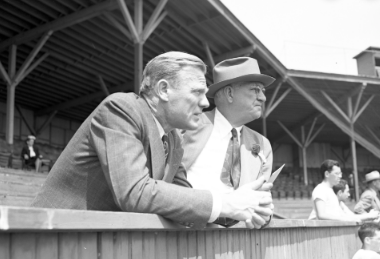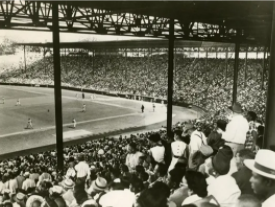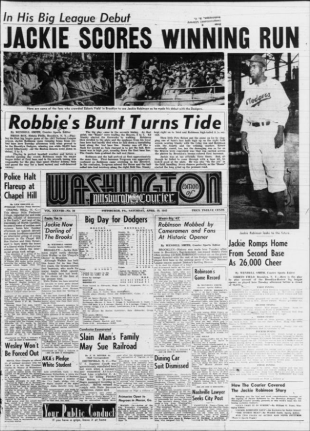
Detroit Tiger scouts Red Rolfe (right) and Wish
Egan (left), 1948
Source: Ann Arbor District Library
(Wheat's Landscape, Athletic Field Maintenance)
"Smith was raised in a white corner of Detroit, where he witnessed racial prejudice from a pitcher’s mound. He hurled a masterpiece in his American Legion team’s 1-0 playoff win, but the Tigers scout who was present signed Smith’s catcher and the losing pitcher, who were white, to contracts. At that moment, a sports career was born, in the newsroom and in the press box."
~ David M. Shribman, The New York Times Journalist, March 8, 2014

Detroit Tiger scouts Red Rolfe (right) and Wish
Egan (left), 1948
Source: Ann Arbor District Library
Wendell Smith grew up in a secluded area of Detroit, and although he was surrounded by white people, he very rarely faced racial discrimination. His father was a personal chef for automobile capitalist Henry Ford, and Smith could often be found playing baseball with the Ford children. As he grew up, Smith became quite the pitcher and was the star player on his integrated American Legion team. In 1933, 19 year old Wendell Smith pitched a shutout in what was one of the most monumental games in his career. Detroit Tigers scout, Wish Egan, had been present at the game and approached Smith soon after it concluded. Egan told the young man that he could be a real asset to the Tigers, and he wished he could offer him a contract. However he regretfully informed Smith that he didn't have the "authority" to sign a man of color. This was the first time in Wendells' life, that the color of his skin truly forbade him from doing what he loved; playing baseball.

40,000 fans attend a Negro Leaguebaseball game, 1938
Source: Yogi Berra Museum and Learning Center
"It was then that I made the vow that I would dedicate myself and do something on behalf of the Negro ballplayers."
~ Wendell Smith, 1971
After Wendell's encounter with Wish Egan, he attended Virginia State College, where he continued to play baseball, but also took up writing for the school newspaper. Writing became a passion of Wendell's and with his future as a professional baseball player looking dim, it gave him an opportunity to express how he and thousands of other African Americans felt about racial inequality. After graduating from Virginia State in 1937, Wendell Smith took a job working as a sportswriter for the Pittsburgh Courier. A year later he was promoted to sports editor. It was through the Courier that Wendell Smith published his articles about skillful black baseball players such as Jackie Robinson.

Article by Wendell Smith about Jackie
Robinson's first game playing for the
Brooklyn Dodger's
Source: The Library of Congress
"You know, when Jackie Robinson was using his baseball glove and bat to battle racial injustice out on the baseball diamond, black sports writers like Wendell Smith of the Pitssburgh Courier, were fighting the good fight with the power of the press."
~ Cameron Turner, Turner's Two Cents, 2013
"Journalism is the protection between people and any sort of totalitarian rule. That's why my hero, admittedly a flawed one, is a journalist"
~ Andrew Vachss, American Author, 1982